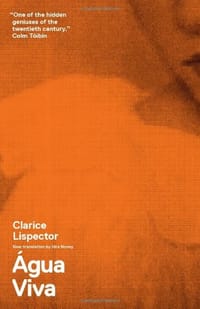书籍介绍
A meditation on the nature of life and time, Água Viva (1973) shows Lispector discovering a new means of writing about herself, more deeply transforming her individual experience into a universal poetry. In a body of work as emotionally powerful, formally innovative, and philosophically profound as Clarice Lispector’s, Água Viva stands out as a particular triumph.
Clarice Lispector (1920–1977), the greatest Brazilian writer of the twentieth century, has been called “astounding” (Rachel Kushner), “a penetrating genius” (Donna Seaman, Booklist), and “one of the twentieth century’s most mysterious writers” (Orhan Pamuk).
用户评论
I am the are-you
行云流水,像闭着眼睛写出来的。
读完卡夫卡之后过来,第一本星辰时刻感觉蛮惊艳,大抵是因为有具体的人物以及事件支撑着,对脉络走向有个模糊的认识。但是这本书通篇以书信的形式,对生命的深刻认识蔓延至颇多的意象之中,仿如呓语,加上又是英语阅读,看起来颇有些困难。
This is not literature. It‘s witchcraft.
Writing about nothing. Stares into the blind darkness, unaware yet doomed. Stare into the panther's eyes, rolling wheels, feel time, space, existence being scratched into pieces of different sizes. See all this just to learn to let go. To flow. To rise or fall freely without a form. To fall asleep with the eyes open
i were reading between sleep and wakefulness
It sparkles and is elastic. I am subterraneously unreachable by my knowledge.它变化自如闪烁着,我对智识隐匿不可及。 a genius of writing instant, rhythm, and failure of writing. In each instant of her effort and failure to write, the writing itself becomes such a living vibration of her passion, passion as flickering between appearing and disappearing of the archaic
On the edge of failing to make sense of the book but I’m bewitched
“The best is not yet written. The best is between the lines.”
Z-Library

